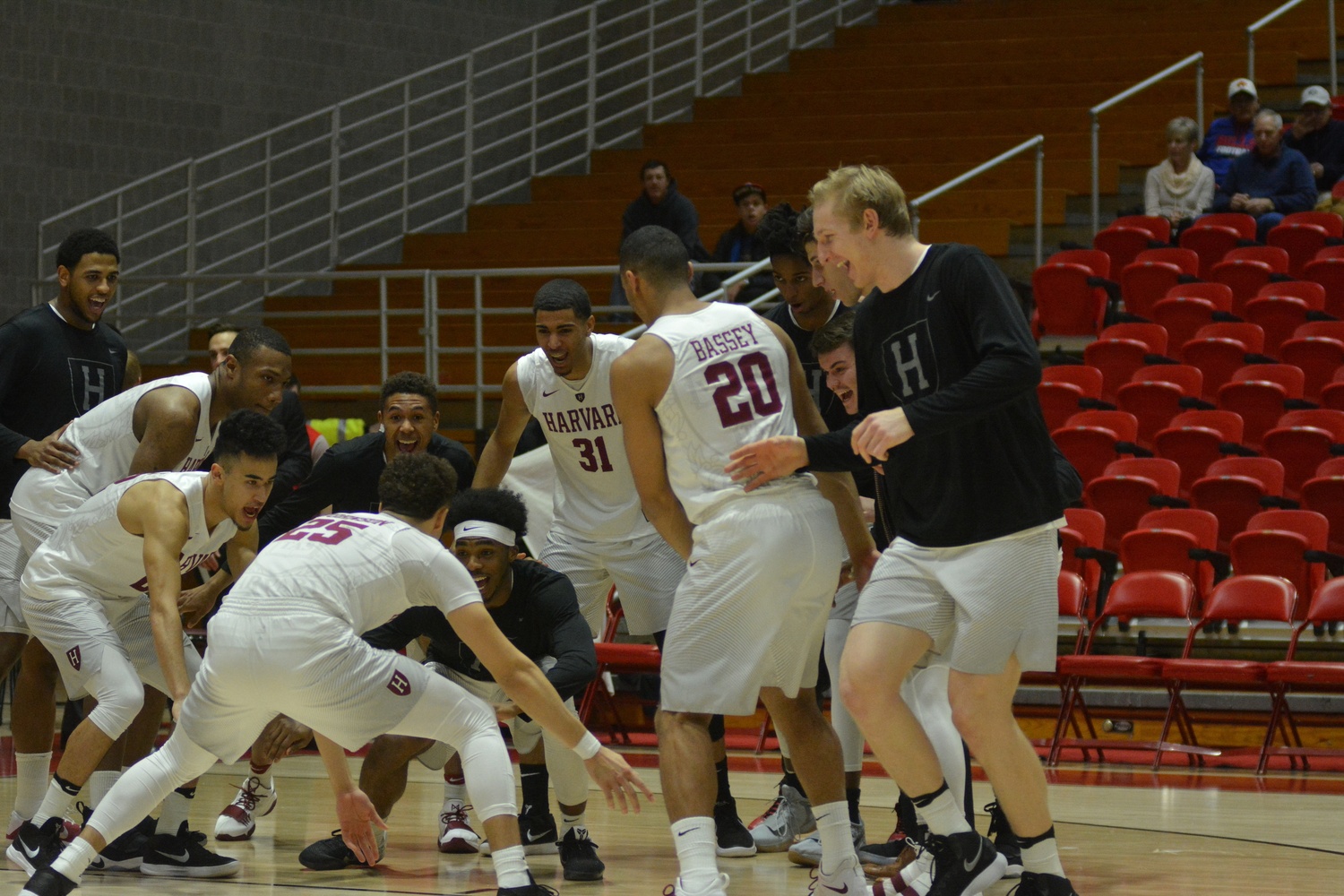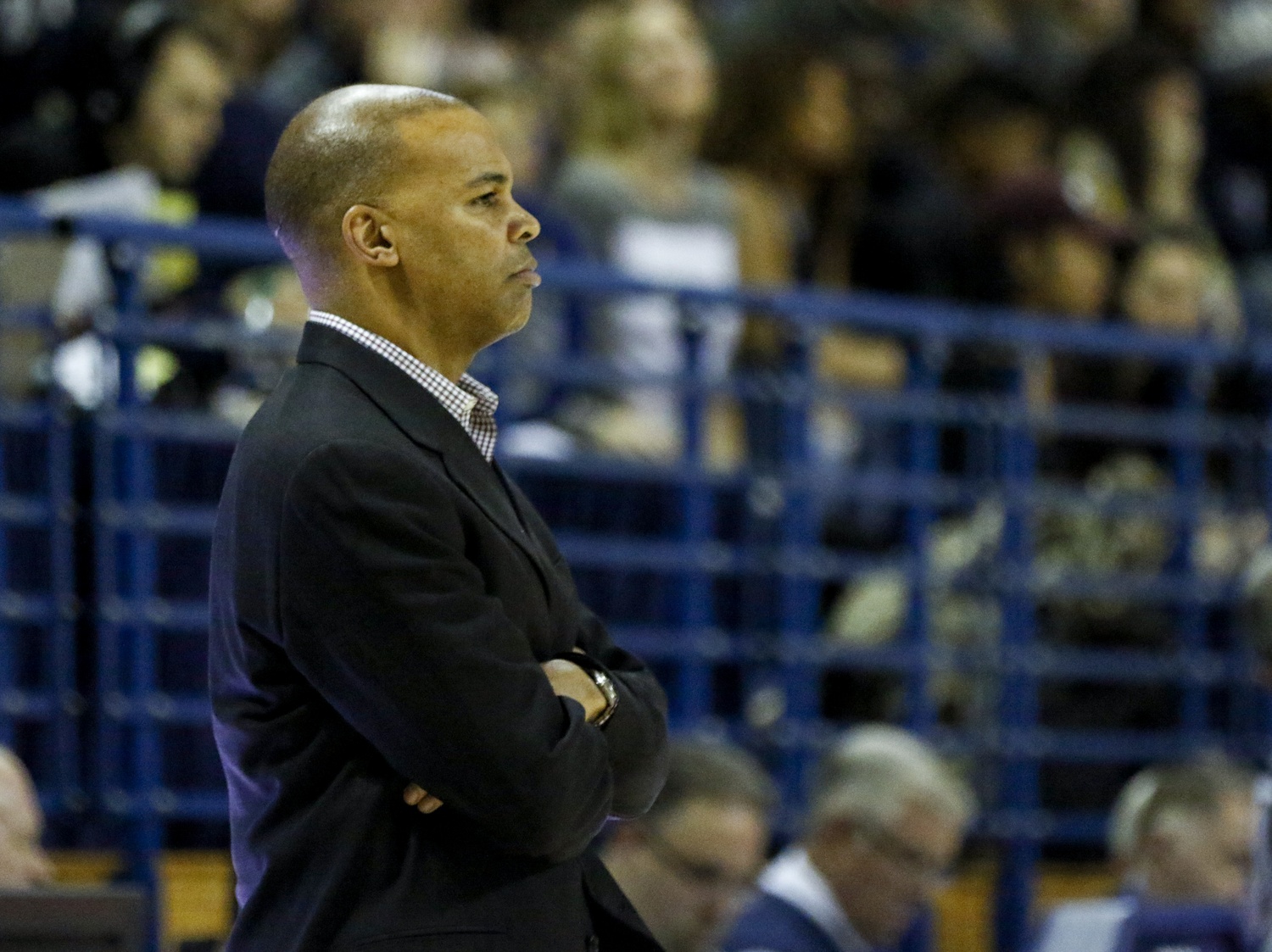
News
When Professors Speak Out, Some Students Stay Quiet. Can Harvard Keep Everyone Talking?

News
Allston Residents, Elected Officials Ask for More Benefits from Harvard’s 10-Year Plan

News
Nobel Laureate Claudia Goldin Warns of Federal Data Misuse at IOP Forum

News
Woman Rescued from Freezing Charles River, Transported to Hospital with Serious Injuries

News
Harvard Researchers Develop New Technology to Map Neural Connections
Men's Basketball Turns to Corey Johnson for On-Court Leadership

An hour before tip-off in Ithaca, N.Y., on Feb. 3., the Harvard men’s basketball team collectively jogged onto the court for the first time. Only a scattering of media and fans was present inside Bartels Hall—Cornell’s multi-sport athletic complex—at that hour, and many were heading towards Lynah Rink, where the nation’s No.1 men’s hockey team was warming up for a duel against its cross-state rival, Rensselaer Polytechnic Institute.
Meanwhile inside a quiet Newman Arena, two voices particularly stood out on the basketball court. One came from head conditioning coach Luke Osberg, who was guiding the Crimson in pregame stretches as they moved parallel from one side of the court to the other.
The source of the other voice: junior forward Corey Johnson, who was noticeably stretching a few steps ahead of the rest of the team. The defeat less than 24 hours ago against Columbia did not seem to affect the energetic three-point specialist, who throughout pregame was exchanging a mix of light-hearted banter and short pump-up messages with a team that, according to head coach Tommy Amaker, was still quite “gassed and tired” from the previous night’s contest.
As the only upperclassmen in Amaker’s rotation with consistent minutes, Johnson has taken over as Harvard’s on-court vocal leader this season. This post in the past was held almost exclusively by Siyani Chambers ’16-’17 and Zena Edosomwan ’17 , whose graduations last year left questions as to who would become the new guiding leader(s) on Amaker’s roster.

The 11th-year Crimson head coach made clear over the summer that senior Chris Egi, a native of Markham, Ontario, had earned his right to be the team’s official captain for the 2017-2018 season.
Egi has been an important mentor to the young Harvard team throughout the season, despite only seeing action in two games. Particularly enthusiastic on the sidelines, the team’s captain has contributed in many ways towards infusing positive energy onto the Crimson.
“My senior class was the last class to win an Ivy League Championship,” Egi said. “I think that kind of gives us some credibility in speaking to the younger guys. We’ve seen what it takes to get there, obviously you have to work hard and they want it. But as a class, not just individuals, we have to step up and just bring that foundation in terms of being vocal leaders.”
On the court, however, Johnson has been the clear headman. During quick breaks in the action, the Ottawa native can often be seen yelling at teammates to gather and huddle. During these team meetings lasting no more than ten seconds, the junior uses this time to settle the team down and offer encouraging statements. Johnson is also extremely outspoken during timeouts, frequently being the last voice before the team returns onto the court.
“I have always found myself as a vocal player on the court and basically I am just trying to do my best to keep everybody together on the floor when we get into moments when we need to recalibrate and regroup,” Johnson said. “I want to make sure everyone is on the same page and we get onto the next play no matter what is going on. If things are going well, if things are going bad, we are always just thinking about the next play and how we are going to win the game.”

The presence of a stabilizing force like Johnson has been critical for a young team that is still struggling through inconsistency and long offensive barren stretches this season.
Against Dartmouth on Jan. 20, Harvard was up by as much as 17 points in the second half before going blank in the next six minutes, ultimately requiring an offensive revival in overtime. A similar pattern occurred in the Yale contest six days later, which saw the Crimson jump out to a 20-5 lead only to allow the Bulldogs to bring it within four by halftime. Made free throws down the stretch were crucial in that victory.
“Even though teams have made late runs on us, we have been able to maintain our composure and consistency on both ends and figure out a way really to grind out a few really good road wins,” Johnson said. “Hopefully we can continue to do that.”
The junior wing has also had to battle against his own shooting woes, particularly early in the season. In a stretch of five games between Nov. 30 and Dec. 23, Johnson shot a combined 6-of-22 from three point range, averaging 4.0 points per game.
Despite this extended shooting slump, Amaker gave his three-point specialist more than 30 minutes of playing time in each of the next three games. Moreover, Johnson was still given the green light to shoot, achieving greater accuracy with nine made triples in 21 attempts.

Amaker’s continued trust and confidence in one of his main perimeter weapons has paid off in recent conference games. Johnson has shot over 40 percent from deep in his past four games, including five made triples against Columbia. Before that Lions game, Amaker attributed making easier shots on helping the shooter regain his touch.
“It’s amazing how shooters and scorers, if they get a free throw or a layup, it changes things,” Amaker said. “Right after that [Corey] made some deep, long shots. I think getting off of the ledger relaxed him and gave him confidence. The next thing you know, he is making shots.”
For Johnson, continued improvement offensively will be critical in balancing out a talented Crimson roster as the team approaches the end of the season. Currently in second place in the Ancient Eight behind the unbeaten Penn Quakers, Harvard will depend on Johnson’s aggressive perimeter shooting to open space for its sophomores and freshmen to attack the rim and create playmaking opportunities.
The junior wing has largely embraced this vocal but complementary role on the team, crediting the importance of ball distribution and communication on both sides of the court for the team’s recent success.
“We have so many offensive weapons that any given night any one of us can pick up the offensive load,” Johnson said. “We are always willing to find that hot hand. We are very unselfish… It is basically finding who is on for that night and hopefully willing to run our offensive through that.”
This type of team-first, collective mentality has become not only an important motto for Coach Amaker, but a message that his team leaders have embraced. In many ways, Johnson’s words echoes the type of openness and trust that Amaker has sought from all members of his program. To lead, as Johnson has demonstrated, involves a balance between gaining a voice and holding others accountable.
“When you see something, say something,” Amaker said. “That is where we are. Embrace that, trust that, and don’t fight it—that’s the way in which we are trying to coach them.”
—Staff writer Henry Zhu can be reached at henry.zhu@thecrimson.com.
Want to keep up with breaking news? Subscribe to our email newsletter.
